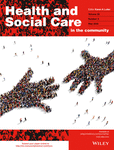Uncovering strengths within community dwelling older adults: What does it mean for health care practice?
Abstract
The aim of this paper is to present the psychological strengths we identified from interviews with community dwelling older adults. Data for this paper is drawn from participants in a community dwelling older adult study. The latter involved qualitative in-depth interviews with the participants exploring their well-being. All participants were community dwelling and living in a region in the North Island of New Zealand. Interviews took place between March 2017 to September 2017. Thirty-seven older adults between the ages of 66–99 took part in semi-structured interviews and all interviews were audio-recorded. Interviews ranged from 1 to 3 hr. Analysis was informed by the Values in Action Character strengths framework. We were able to identify strengths within the VIA conceptual framework comprising; cognitive strengths, emotional strengths, social and community strengths, protective strengths and transcendental strengths. Throughout this study we found that participants experienced difficulties in identifying and talking about their strengths. In many ways this may reflect participants' strength of humility, demonstrating modesty in talking about themselves. This study has highlighted the challenges older adults experienced in identifying their own strengths. However, the study has demonstrated how narratives can be one way of uncovering psychological strengths with older adults. In particular, these findings highlight the range of strengths, for example, bravery, gratitude, hope, humour, kindness, perseverance, spirituality, that older adults have and give a voice in highlighting these. However, more practical ways of making strength-based practices workable in daily practice, for example, in clinical assessment and health promotion programs are required.
CONFLICT OF INTEREST
There are no conflicts of interest for any of the authors.




